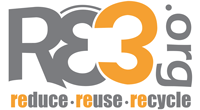Guest Blogger – Jessica
Every year North Carolinians throw away enough trash to circle the earth, a circumference of nearly 25,000 miles, two times. If we continue this pattern of trash disposal at the rate we are now, our current landfills will overflow.
Even then, landfills will be the least of our problems: the amount of greenhouse gas emissions will be sky-high, contributing to climate change. The release of greenhouse gases, such as carbon dioxide and nitrous oxide, occur from burning fossil fuels when raw materials are extracted and processed. Recycling can help. Recycling products can decrease the amount of waste we produce that must be dumped into landfills, and it can also allow new products to be made without using raw materials.
North Carolina needs an initiative strong enough to ensure that everyone will recycle. Mandatory recycling programs, along with strong enforcement, do exist in other cities and could be tested in here.
In 2006, Seattle implemented a mandatory recycling law in which recyclables were forbidden from residential and business garbage. The enforcement policy for businesses is slightly different from residences. If more than 10 percent of the business’ trash is recyclable, a warning tag will be left behind, and on the third tag a $50 fine is issued. Fines are not distributed for houses or apartments: however, a tag is left and the city asks the residence to sort the trash in order to be picked up the following week. Since starting enforcement, officials have noticed a high response rate among Seattle residents, a decrease in tags left, and no fines issued.
In 2009, Seattle added yard and food waste to the list of mandatory recycled products. It appears that it was following in the footsteps of San Francisco, Calif., the first city in the United States to require that all food scraps from homes, apartments, businesses and restaurants be recycled and composted.
Other major cities that have adopted mandatory recycling programs include New York and San Diego. Can this be done only in large metropolitan areas? I challenge N.C. communities to create mandatory recycling programs and effective enforcement of those laws.
Two main arguments for the opposition of mandatory recycling are that enforcement is impractical and recycling often costs more than dumping trash in a landfill.
Recycling benefits outweigh the cost when businesses are saving money by making products from recycled goods, using less energy and developing less reliance on expensive, nonrenewable natural resources. The environment is priceless: what will be the value of money if our world is too polluted to live in?

No comments:
Post a Comment